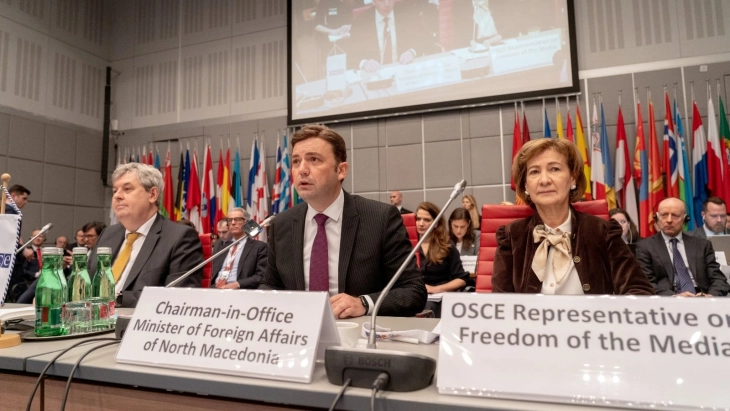Osmani: OSCE principles non-negotiable, responsibility shared by all 57 member states
- The principles and obligations of OSCE cannot be subject to negotiations. What we can do is work with all member states in order to renew dialogue and reaffirm our commitment to these princip

Skopje, 12 January 2023 (MIA) – The principles and obligations of OSCE cannot be subject to negotiations. What we can do is work with all member states in order to renew dialogue and reaffirm our commitment to these principles, said OSCE Chairman-in-Office and Foreign Minister Bujar Osmani in Vienna on Thursday.
“Our task is to lead an organization in these difficult times and this responsibility is shared by all 57 member states, with the aim of fulfilling our priorities and the program that serves the citizens and all member states. We don’t need to come up with new solutions, the principles and obligations of our Organization cannot be subject to negotiations. We will not and we cannot negotiate about the principles that serve as the foundation and the reason for the existence of this Organization. What we can do is work with all member states in order to renew dialogue and reaffirm our commitment to these principles,” FM Osmani told a press conference after the presentation of the priorities of North Macedonia’s 2023 OSCE Chairpersonship.
He noted that the motto of North Macedonia’s Chairpersonship, “It’s about people,” stems from the set goal to stress that the Organization plays a key role, makes changes on the ground and influences people’s lives.
“That will be our main narrative and the way in which we will convince the countries that we must commit to the Organization’s principles again, because they are the foundation for sustainable peace, security and directly affect people’s lives. This is our creative idea, which was not invented by us but by the founders of this Organization,” underlined Osmani.
OSCE Secretary General Helga Schmid said this is one of the most difficult years in the Organization’s history but added that other international organizations and multilateralism are affected too. In this case, this is the result of the actions of an OSCE member state that has violated the basic principles of the Organization which is why she agreed with Osmani that a firm reaffirmation and commitment to the basic rules of OSCE is crucial.
Regarding the survival of the Organization, which makes decisions based on a consensus, Schmid pointed to a new model of financing, a new program developed in recent months outside of the budget framework, in the form of donations for projects, for which the rule of unanimity does not apply. This has allowed the Organization to be operational again, and they already have personnel in Kyiv at the request of the Ukrainian government who are working on projects on the ground.
OSCE consists of 57 member states which include the USA, Russia and Ukraine. The Organization also has 11 partner states. ad/ik/